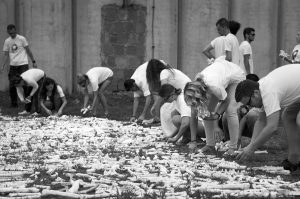Post Conflict Research Centre (PCRC)
Multi-media; film and photography; Bosnia

The Post Conflict Research Centre, based in Sarajevo, is dedicated ‘to restoring a culture of peace and preventing conflict in the Western Balkans’ through creative multi-media projects. Using photography, film and developing innovative media and arts based peace education programmes, PCRC’s work targets public and youth audiences and seeks ‘to propel dialogue, transform public opinion, elevate underrepresented voices, and inspire hope, intercultural understanding, and cooperation’[1].
Founded by Velma Šarić and Leslie Woodward in 2011, PCRC engage in research, consultancy and transitional justice activities alongside their visual media and peace-building programmes. Arguing that ‘creative multimedia has the power to serve as a pathway for building peace’ and ‘reinforce critical inquiry’ in the peace-building process[2], PCRC produces and curates films and exhibitions alongside which they developed peace-building education programmes and workshops. Šarić notes the failure of mainstream media in BiH, the ‘role of the media should be as a tool of reconciliation but we have a completely biased, manipulated media’[3]. She argues that more traditional forms of engagement in post conflict society are no longer effective,
‘We really need to be creative and inventive to even get young people together in the same room. What has been proved in 15 years of work was that if you use art and social activities as a reason to bring young people together it is much easier than if you do a workshop about dealing with the past. They are so overloaded with the war context, and in a country with the biggest unemployment rate in Europe, with all theses issues its really hard to just bring them together.’ (Šarić, interview 2017)
With much of their work being youth focused, Šarić sees film and photography as a way to re-humanise the ‘other’, a ‘way of telling stories that young people can directly empathise with and see other people’s lives’ and a way of creating a permanent record that can be accessed in the future (Šarić, interview 2017). Using a socially engaged multi-media production process that is ‘collaborative and co-operative, Šarić describes how PCRC ‘consider the process as important as the product as it entails building relationships based on trust, while the product aims to activate the audiences exposed’.
Ordinary Heroes Peacebuilding Program, one of PCRC’s flagship initiatives that utilises stories of rescue and moral courage to promote tolerance, reconciliation and inter-ethnic co-operation, provides a good example of how the organisation builds multi-faceted media educational projects out of the photography and films they produce. Ordinary Heroes documentary series features 4 stories of Bosnian citizens who at a risk to themselves and their loved ones chose to rescue an ‘other’, someone from a different ethnic group, a friend, neighbour and sometimes a stranger, during the Bosnian war. The Rescuers is a photographic exhibition that brings together portraits and stories ‘ordinary heroes’ from 4 different countries facing conflict and genocide. The Ordinary Heroes Peacebuilding Program used these documentaries and photographic exhibition as the basis for a reconciliation-focused participatory education workshop focused on rescuer’s stories and the notion of moral courage which PCRC have conducted with over 1000 youth in municipalities all over BiH. The linked Srđan Aleksić Youth Competition, running for the last 2 years, encourages young people to discover, collect and share stories of peace-building, moral courage and inter-ethnic cooperation from their communities. The aim is to ‘inspire Bosnian youth by encouraging them to take an active role in the promotion of positive examples of Bosnian citizens who are making a difference in the lives of others’[4].
Another project is My Body: A War Zone, a photographic exhibition that documents the use of sexual violence as a weapon of war through the testimonies of women survivors from around the world. The transitional justice academic Olivera Simic writing about the exhibition describes how ‘these acts of acknowledgement are an important part of transformative reparation’ (Simic 2016:25).
Balkan Discurs was initiated in response to the lack of transparent and accurate media with the aim of establishing a unique pan-ethnic media outlet and platform for Bosnian youth and PCRC’s international volunteers. Committed to challenging stereotypes and providing diverse viewpoints the online platform publishes a wide range of articles by young writers covering contemporary issues and sharing ideas on how BiH can achieve positive social change in various sectors.
Šarić emphasies that PCRC’s work is about ‘working with youth to reconcile the histories that have been passed on to them and to avoid that history being repeated’. Dealing with the past ‘behind closed doors’ does not work anymore, she insists (Šarić, interview 2017). However PCRC is careful about the language they use to articulate their perspective, Šarić notes that they try to avoid the term ‘reconciliation’ preferring to use language such as ‘interethnic co-operation, understanding, tolerance building, mutual understanding, dialog, and empathy building’. They also steer clear of framing their work in the context of forgiveness, although they do note that ‘we do measure that with youth after the workshops they are much more susceptible to accepting the other’.
“Its obvious that during the war, the siege, art was a symbol of resistance, now it’s a symbol of a good reason to bring people together… it helps them think outside the box” Velma Šarić, PCRC president, interview 2017.
[1] Quotes taken from PCRC mission statement on its website: http://www.p-crc.org
[2] Quote taken from PCRC website: https://p-crc.squarespace.com/creative-multimedia
[3] Velma Šarić and Leslie Woodword were interviewed for this research, November 2017
[4] Quote taken from PCRC website: https://p-crc.squarespace.com/our-projects/ordinary-heroes-peacebuilding-program
